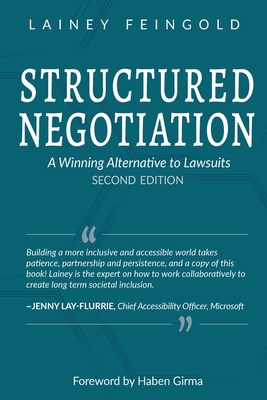Structured Negotiation
A Winning Alternative to Lawsuits, Second Edition

Author
Lainey Feingold
disability rights lawyer and author
Author
Details
- Print length 407 pages
- Publication date October 13, 2021
- Available in Paperback and eBook
About the Book
Structured Negotiation: A Winning Alternative to Lawsuits introduces a groundbreaking method for resolving legal disputes through collaboration, not confrontation. Developed and refined over more than two decades, Lainey Feingold’s approach offers a compelling alternative to the traditional legal model—especially in the context of accessibility and disability rights.
Drawing from real-world cases and long-term partnerships with major corporations, financial institutions, government agencies, and advocacy groups, Feingold illustrates how meaningful change can be achieved without ever stepping into a courtroom. The book details how Structured Negotiation has led to widespread digital accessibility improvements in banking, education, healthcare, transportation, and more.
Why It Matters
Litigation has its place in civil rights advancement, but it can also be adversarial, expensive, and slow. Structured Negotiation offers a more human-centered legal process—one based on trust, cooperation, and problem-solving. This approach gives voice to people with disabilities, promotes systemic change, and builds long-lasting relationships between advocates and institutions. It's a model rooted in mutual respect, and it’s already reshaping how accessibility goals are achieved in the digital age.
What You’ll Learn
- How to build legal relationships grounded in trust and transparency
- Real-world examples of successful accessibility improvements without lawsuits
- Techniques for negotiation that prioritize storytelling, inclusion, and empathy
- Ways to shift from adversarial tactics to cooperative solutions
- How lawyers, advocates, and organizations can adopt Structured Negotiation in their own work
- Tools to center the disability community in digital accessibility improvements
Key Topics Covered
- Origins and principles of Structured Negotiation
- Case studies involving web and mobile accessibility, ATMs, kiosks, voting systems, prescription labels, and more
- The legal, ethical, and social benefits of collaborative dispute resolution
- Strategies for involving disabled people directly in negotiations
- Practical guidance on structuring agreements, timelines, and accountability without litigation
- Perspectives from lawyers and advocates using this model around the world
Who Should Read It
- Lawyers and legal professionals exploring alternative dispute resolution
- Accessibility professionals and digital inclusion advocates
- Disability rights activists and organizations
- Corporate and institutional leaders responsible for compliance and DEI
- Law students, mediators, and changemakers seeking a more ethical legal path
Final Thoughts
Structured Negotiation is both a practical manual and a hopeful manifesto. It demonstrates that legal progress doesn't have to be combative—and that trust-based relationships can lead to meaningful, enforceable outcomes. Whether you're a lawyer seeking new tools, a business leader aiming to avoid litigation, or an advocate for disability justice, this book offers a powerful reminder that change is possible when people come to the table as partners.
Leave a Review for This Book
Every reader’s perspective adds value. Whether this book challenged you, inspired you, or wasn’t your favorite, we’d love to hear about it. Sharing your honest review helps others find books that resonate. All reviews will be published on the book’s page. Your email will stay private.
Thank you for submitting your review! Once it’s been reviewed by our team, it will be published on the book’s page.
We appreciate your contribution to the Accessibility Book Club community.
Discover the power of knowledge through our featured book.
Each book offers an opportunity to learn from industry leaders in the exploration of digital accessibility principles and practices. The titles serve as a vital resource for professionals seeking to enhance their understanding and implementation of industry standards.
Key Themes
Inclusivity, user experience, and practical strategies for accessible design are all taken into consideration when choosing each book.
Accessibility Highlights
We love books that dive deep into accessibility principles, best practices and teach readers common terminology and techniques.


"Knowledge is power." - Thomas Jefferson
Discover Your Next Read or Suggest One for the List
Explore the curated selection of books on our annual reading list. If you do not see a title you think we should read please let us know. Be apart of our vibrant community to enhance your knowledge and skills in inclusive design.
Join the Book Discussion
We want to know more—share your thoughts and insights with fellow members.

Member Feedback
This is what our members are saying about the club:
It brought me closer to the people who really care for accessibility. The Accessibility Book Club has been an incredible space to share ideas, learn from passionate individuals, and grow as an advocate for inclusive design. I also connected with Manuel, the author of Web Accessibility Cookbook, and had the prestigious opportunity to professionally review his book and learn his inspiring story. As someone deeply inspired by accessible design—especially with my mother being a teacher for students with special needs—this community holds a special place in my heart. 💙


Yash Raj Bharti
UXE (front end) Lead
I love the Accessibility Book Club. The participants bring such good questions, and the Club is so thoughtfully organized. Sometimes we talk about care as a value in disability work in ways that can get unarticulated in the context of more technical work. I found Accessibility Book Club to be a great place for smart conversations done with care about access work. I'm incredibly grateful to have had my book read and discussed by this group. Thank you all!


Ashley Shew
Associate Professor of Science, Technology, and Society
I joined the Accessibility Book Club because accessibility is something I care deeply about, and I wanted to connect with others who truly 'get it.' It’s a space where I can learn, and be part of a community that shares my passion for making an impact.


Dr. Nicole L'Etoile, Ed.D.
Learning Experience Designer
I was overwhelmed when I clicked the Zoom link and saw a full screen with faces looking at me. All these people decided to spend time with me and ask questions about my book and accessibility. That’s an experience I will never forget. The Accessibility Book Club is a unique and invaluable initiative I can wholeheartedly recommend.


Manuel Matuzović
Author Web Accessibility Cookbook
I have always wanted to join a book club and was very happy when I discovered one that was about accessibility! Not only does this book club give us the chance to learn more, it also gives us a platform to connect with people passionate about accessibility.


Amber Wilson
Founder & CEO
I joined the Accessibility Book Club after hearing my advisor speak about her book, and I’ve been inspired by the opportunity to discover what this incredible community is reading in the ever-evolving world of accessibility.


Sonal Sathe
Doctoral Student
I recommended the Accessibility Book Club to my daughter, an aspiring UI/UX designer, so she could connect with a community of professionals and access the wealth of knowledge in the books we’re reading. This group isn’t just helping her education—it’s setting her up to be a standout candidate in her future career.


Dana McMullen
Digital Accessibility Trusted Tester and Consultant


